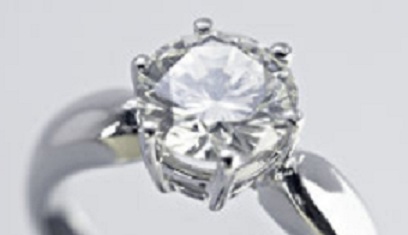Posted On: Thursday - August 10th 2017 6:49PM MST
In Topics: Salesmen Global Financial Stupidity Economics Books Big-Biz Stupidity Scams
... it's just that he's a friend in the way that the Hildabeast might be to a poor black man. She wants the vote, that's all, and would never want him within 5 miles of her nice home in Chappaqua, NY. The guy at the jewelry store won't be your friend anymore if you ask him why you can't get even 90% of your money back a day later for this "precious stone".
Perhaps your "friend's" name is Jarrod. Have you seen the commercials? I noticed the attractive women in them seem very horny due to receiving a gift of a $5,000 (I don't know the prices, and I don't want to know) piece of rock. "He went to Jarrods, pant .. pant ... oooohh!" That's the idea, see, according to the commercial - just go spend a month's salary or two once in a while, and your wife will be all smiley and horny for a week, maybe longer. They don't want you to think with your other head, the higher-up one, about this hellacious deal. "Hey", logic says, "for that money I could go on a coupla' trips to Thailand and have sex with DIFFERENT hotties each night for weeks at a time, and there's a beach there, apparently."
OK, maybe you're married, so Thailand may be off your plans, but then this means you were involved in the scam I want to write this post about already.
Here's a picture of this scam:

Try finding out how much that polished piece of mineral really costs by seeing how much a store would actually buy it back for. Did you wonder why you could bargain them down pretty heftily, yet they still seemed pretty happy to sell it to you. Who started this engagement ring rip-off idea to begin with? (easy answer for that one - DeBeers of South Africa)
I got interested in this diamond business when I read a great short-book-length piece of writing on the web about 10 years back, and it's still on there! A Mr. Edward Jay Epstein put this information in simple web-site format that can be read in say, 1 week of an hour's reading a night. It is extremely interesting, and HERE is the Prologue, with links to each of the 22 short chapters. Peak Stupidity cannot excerpt the whole thing, of course, but it's hard to pick any particular best part. However, from the prologue:
In Japan, the matrimonial custom had survived feudal revolutions, world wars, industrialization and even the American occupation. Up until the mid-196os, Japanese parents arranged proper marriages for their children through trusted 'intermediaries. The ceremony was then consummated, according to Shinto law, by the bride and groom both drinking rice wine from the same wooden bowl. This simple arrangement had persisted for more than a millennium. There was no tradition for romance, courtship, seduction and prenuptial love in Japan; and no tradition that required the gift of a diamond engagement ring.This is just the intro, but it is a taste of what Mr. Epstein learned about the marketing aspect of the diamond business.
Then, in 1967, halfway around the world, a South African diamond company decided to change the Japanese courtship ritual. It retained J. Walter Thompson, the largest advertising agency in the world, to embark on a campaign to popularize diamond engagement rings in Japan. It was not an easy task. Even the quartering of millions of American soldiers in Japan for a decade had not resulted in any substantial Japanese interest in giving diamonds as a token of love.
OK, the reader may be wondering right here "they're precious gems, better than paper currency, as PS has been badmouthing all under this topic key, so what's wrong with diamonds?", Well, let's compare to precious metals like gold? In some countries, especially India, prospective husbands give gold to prospective wives. I understand the idea, though it's very arguable, that something not practical, but of high value, shows one's love, respect, and amount of value for this woman. Yeah, a small SUV seems more practical to me too, but listen, there's a big difference between a precious metal and diamonds, as told my Mr. Epstein. The first thing to learn is that the diamond business is monopolized so much by the one company, DeBeers, that the real value is only set by how many diamonds they want to put on the market yearly. It is so far from a free market that even a hard-core Commie (upon getting engaged) may take offense. As the gold/silver mining business is fairly open and transparent, and the amount in the world can't be changed easily or quickly, the diamond business is secretive and only a few know what really goes on - DeBeers aims to keep it this way.
Here is another contrast with precious metals. As of yet, they still cannot be manufactured (OK, minute amounts in expensive research reactors). Diamonds have been manufactured for many years now, for cutting tools and what-not. What's that, they (the jewelry store owners) say, "oh, but they have flaws". Diamonds are valued by how few flaws they have. Now, however, the manufacturing techniques are such that some small perfect ones can be made. "Wait, they have no flaws, so you know they are man-made, not real!", says Jarrod. "Real diamonds are Forever." (whatever!)
This is really a bad point at which to stop the post, but it's getting long, and there will be a continuation tomorrow on (all from Mr. Epstein's book):
a) The control of, and production in, the diamond mines.
b) The wholesale marketing/distribution of diamonds.
c) The retail marketing long-term scam of the diamond business.
Comments: